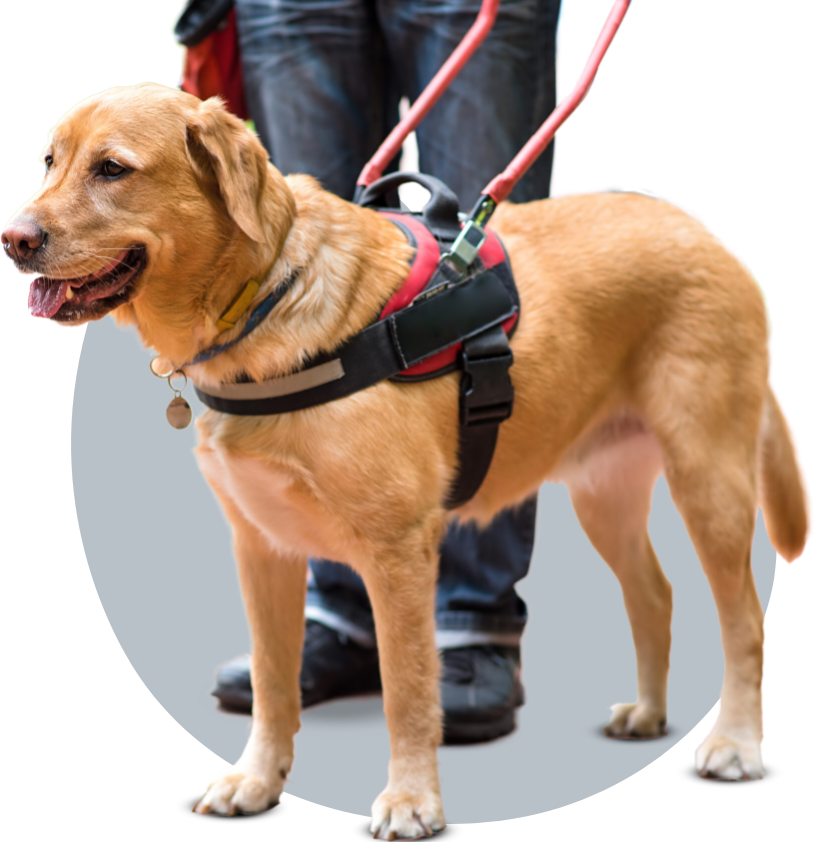Why You Shouldn’t Fake Having a Service Dog

Everyone wants to have an animal companion. After all, there’s a certain romance in the idea of being accompanied by a dog anywhere you go. And it seems that many people today are lured by the ease of just calling Fido a service dog and letting the dream of that constant companion come true. Once a service dog, they can take their beloved pet to the movie theatres, to restaurants and to malls.
Very appealing, right?
Perhaps on the surface. But there’s a reason real service dogs exist and it’s not for the luxury of having pet companion everywhere. By faking a service dog, you create unfortunate—albeit unseen, in many cases—consequences for both those who actually have service dogs, due to a need, and for businesses who try to comply.
Think about it:
Would you pretend to be handicapped to get the best parking? Would you pretend to be a veteran to get discounts? Pretending to have a service dog is no less morally dubious, and yet it seems people are ready to excuse themselves in this particular instance—perhaps because it has become so commonplace that the ethics are easier to ignore. Or perhaps a sense of entitlement develops where pets are concerned.
Whatever the reason, it’s important to understand that faking a service dog has a negative impact on the community.
What is a service animal?
Service animals are dogs (and in some cases, miniature horses) trained to perform major life tasks to assist people with physical or severe psychiatric impairments or disabilities.
Note that they have special training—not just to help the person whom they work for in essential tasks, but to behave in a certain way in public in order to be unobtrusive. For example: no barking, no begging, and most definitely no growling or other form of aggression towards others. They also know to tuck themselves out of the way under a table or between their human’s legs to create little to know disturbance to others. These are working animals.
Where can service dogs go?
Under the Americans with Disabilities Act (ADA), state and local governments, businesses, and nonprofit organizations that serve the public must in general allow service animals to accompany people with disabilities in all areas of the facility where the public is allowed to go.
This of course is the appeal of pretending to have service dog—they are allowed nearly everywhere, so long as they don’t create a potential hazard (such as in an operating room). However, you should remember that you’re not just pretending that your dog is a service dog. You’re pretending that you are a person in need of a service dog.
Who needs a service dog?
For a person to legally qualify to have a service dog, he/she must have a physical impairment (or severe psychiatric impairment) that substantially limits his/her ability to perform at least one major life activity without assistance. There are no limitations with respect to the kinds of impairments and disabilities this applies to.
So, in other words, if you pretend your dog is a service dog, you are also pretending that you have a physical or psychiatric impairment.
How faking a service dog undermines the people who really need them
Every time an untrained dog passing as a service makes a mistake in public—such as jumping up on people, growling, etc.—it creates a bad impression of service dogs. This might not seem terribly consequential if you’re only faking your service dog and don’t really have a need. But for those who really are dependent on their service dog, the bad rap they are getting from all the fake “service dogs” creates extra stress.
For example, if a restaurant had a bad experience with a phony service dog in the past, they may be less than welcoming to an individual with a well-trained, professional service dog. It can be incredibly frustrating for those with real service dogs to have to explain again and again that their service dog is actually trained to provide assistance in every day life and will not cause disruption.
Even more horrifying are the cases in which fake service dogs have attacked and wounded—or in some cases even killed—real, highly trained service dogs, something that is horrible for many reasons, not least of which is that the impaired person is now without their necessary support. Faking a service dog puts both the reputation and the lives of real service dogs in jeopardy.
Faking a service dog can also stress out the greater community.
Why faking a service dog hurts the community
A person with a service dog is not required by law to carry documentation. Furthermore, business owners can only ask two questions of anyone who has a service dog: “Is it a service animal?” and “What is it trained to do?”
Any other question, such as inquiries into the particulars of an individual’s disability, for example, is strictly prohibited.
And herein lies the apparent ease of faking a service dog: Because you are not required to carry documentation and business owners don’t want to risk a lawsuit by asking too many questions, they often let the dog enter, even if the veracity of the dog’s status seems questionable.
The problem is that faking a service dog not only undermines people with real disabilities, it also creates a tough situation for businesses. For example, imagine a restaurant that has to deal with people faking service dogs that are untrained for this sort of social setting. These dogs might bark, whimper, whine, beg, or even relieve themselves in that space, annoying other customers and even driving them away, thus putting business owners in an unfair bind.
This is part of the reason that a widespread flagrance of the law has now led to the laws being more strictly enforced.
New enforcements on service dog laws
In the last 3 years, many states across the country have signed legislation to enforce punishment of people falsely claiming a service dog. Punishment in most cases includes a fine and a misdemeanor charge. The hope is that the new laws will discourage such rampant abuse of the service dog title. A real service dog has a serious job to do.
While these laws will hopefully help to mitigate the negative impression fake service dogs give to the world, those with real service dogs may want to consider getting their animals registered to avoid confrontation and hassle.
Why register your service dog?
Registration is not federally mandated or compulsory, but voluntary. While it may seem that registering is unfair, it can really make your daily life easier. Registering your service dog not only legitimizes your dog (making him/her look official) but eliminates nearly all the hassles and confrontation you’ll encounter without it
That’s the reason National Service Animal Registry exists: To make life easier and less problematic for the disabled! Several members of the NSAR staff group are disabled and attest to how much easier it has been to take their animals in public after they were registered and attired appropriately.














































































